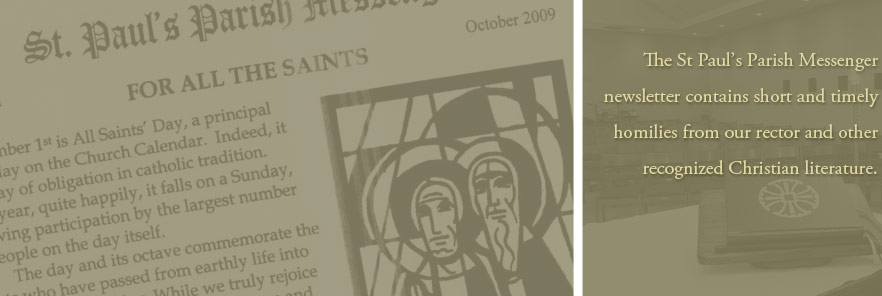April 2008
Someone telephoned a week or so ago, after reading the notice posted at the door of New Parish Hall, and asked, “What are the Fifty Days of Easter?” It occurred to me that others might likewise be wondering about the designation.
Originally the resurrection and ascension of our Lord, as well as the coming of the Holy Spirit at Pentecost according to his promise, were all part of a fifty-day celebration of the establishment of the Church. Only in the fifth century – in accord with piety’s way of drawing out and distinguishing between matters of faith – were these three elements separated into distinct observances, so holy days on the liturgical calendar.
Having passed thru another Easter, we are now drawing near Ascension Day. The term and the idea says, quite plainly, as the traditional scriptures for the day clearly indicate, that sometime following our Lord’s resurrection he was “taken up” or “carried up” into heaven. While the two stories differ substantially as to when the happening occurred, it is perfectly plain that Jesus is ultimately glorified and that in him we have immediate (right hand) access to our Father God. See Acts 1.1-11 and Luke 24.49-53.
The concept of Jesus being taken into heaven is not easy to understand. Indeed, even one of Anglicanism’s better known bishops, John Robinson, said some forty-five years ago that the idea of a “three storied universe” in which such happenings could occur was so offensive that no twentieth century thinking person could embrace it. Well, despite his fine work in other New Testament studies, the bishop had it entirely wrong in this case. In the last analysis, the ascension of Jesus is not something that rests on human ability to comprehend.
Rather, like God coming down in an earthly son at Christmas and his rising from death at Easter, it is a divine glorification of all that God intended in him. Put another way, it is the theological truth that things have come full circle: Christ has come from God! Christ has returned to God! Christ is forever with God, making intercession for his faithful followers!
Even more astounding, the faithful who lay hold of all this in the present fifty days are those who thereby, like the disciples at the first Christian Pentecost, receive power from on high, the Holy Spirit, according to the Lord’s promise. Given the Parish’s sense of spirit, devotion to the apostles’ teaching, and steady growth, his promise seems surely to be resting upon on us as well (Acts 2.40-41).

